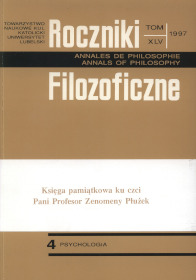Therapy of Scrupulous Conscience
Abstract
Scrupulous conscience is characterized by an anxious, inadequate and negative moral evaluation of one's thoughts, words, and deeds. This phenomenon is connected with deformations in moral evaluations. The scrupulous person is often thought to find it difficult to distinguish evil from good. A closer analysis, however, points mainly to the legalistic level. The scrupulous person usually judges his deed rather from the legal point of view, along the line: permitted-prohibited, and not in the categories of good-evil.
Psychiatrists and psychologists treat scruples as a specific manifestation of obsessive neurosis, with the stipulation that not in every neurosis of that kind there occur symptoms called scruples, for not all its symptoms must have a moral content, nor every neurosis deforms conscience. Apart from that the scrupulous people, as a rule, do not have any other types of neurotic symptoms.
In the remarks on the “pastoral therapy” of scrupulous conscience the tasks of a clergyman and psychotherapist (psychiatrist, psychologist) have been defined and characterized. It has been stressed that in difficult cases it is an optimal situation when a priest and a psychotherapist work together, providing of course strictly defined conditions, dependent on various competencies. There may be situations when a priest, having no contact with a psychotherapist, must manage the process of the “therapy” of conscience on his own.
Some basic practical postulates have been put forward, all of them indispensable when a priest wishes to be effective in his role as a confessor and “therapist,” as regards moral and religious affairs of the people with a neurotic conscience. Such proposals are in now way detailed recipes, therefore one should be flexible in their interpretation. In each case those proposals should be adjusted to personality traits of a given person and to the specific character of his or her problems.
References
Arienzo U. (1962). Scrupulo – scrupolosi. Dizionario di teologia pastorale. Roma: Ed. Paoline, s. 1611-1613.
Berg R. F., McCartney Ch. (1981). Depression and the integrated life. A Christian understanding of sadness and inner suffering. New York: The Society of St. Paul.
Casey D. (1956). The nature and treatment scrupules. Dublin: Clonmore and Reyndols.
Chlewiński Z., Grzywa A. (1992). Urojeniowa wizja świata. Warszawa: Wiedza Powszechna.
Chlewiński Z. (1991). Dojrzałość. Osobowość, sumienie, religijność. Poznań: W drodze.
Chlewiński Z. (1989-1990). Psychologiczna analiza sumienia skrupulatnego. Próba typologii. Roczniki Filozoficzne, 37-38 (4), 29-58.
Chlewiński Z. (1985). Psychologiczne uwarunkowanie idei Boga. W drodze, 3, 97-102.
Chlewiński Z. (1982). Rola religii w funkcjonowaniu osobowości. W: Z. Chlewiński (red.), Psychologia religii. Lublin: Towarzystwo Naukowe KUL, s. 61-76.
Conn W. E. (1981). Conscience. Development and self-transcendence. Birmingham: Religious Education Press.
Dębiec J. (1996). Prawda w psychoterapii. Znak, (9) 496, 73-76.
Evdokimow P. (1996). Wieki życia duchowego: od Ojców pustyni do naszych czasów. Tł. z jęz. fr. M. Tarnowska. Kraków: Znak.
Freeman L., Strean H. S. (1986). Guilt. Letting go. New York: Wiley.
Grenberg D., Witztum E., Pisante J. (1987). Scrupolosity: Religious attitudes and clinical presentations. British Journal of Medical Psychology, 60, 29-37.
Grzegołowska-Klarkowska H. J. (1986). Mechanizmy obronne osobowości. Warszawa: PWN.
Horney K. (1978). Nerwica a rozwój człowieka. Trudna droga do samorealizacji. Tł. z jęz. ang. Z. Doroszowa. Warszawa: PIW.
Jakubik A. (1975). Psychologia poczucia winy. Psychiatria Polska, 9, 297-305.
Khanna S. (1988). Obsessive-compulsive disorder: Is there a frontal lobe dysfunction? Biological Psychiatry, 24, 602-613.
Kretschmer E. (1958). Psychologia lekarska. Warszawa: PZWL.
Król J. (1989). Postawy rodzicielskie, poziom samoakceptacji a pojęcie Boga. Studium psychologiczne. Lublin: Redakcja Wydawnictw KUL.
Kuczkowski S. (1978). Poczucie winy w świetle praktyki klinicznej. Znak, 8, 1013-1030.
Lewis H. B. (1987). Poczucie winy w obsesji i paranoi. Nowiny Psychologiczne, 4, 47-64.
Lopez-Ibor J. (1956). Zwang, Phobie und Skrupel. Jahrbuch für Psychologie und Psychotherapie, 4, 92-101.
Mailloux N. (1959). Sancitity and the problem of neurosis. Pastoral Psychology, 10, 37-43.
Mailloux N. (1965). Scrupulosity in pastoral work. W: W. C. Bier (red.), Personality and sexual problems in pastoral psychology. New York, s. 68-81.
Mailloux N. (1967). Scupolosità e inconscio. Anime e corpi, 18, 115-128.
Mailloux N. (1967). Tipologia dello scrupolo. Anime e corpi, 19, 187-197.
Mora G. (1969). The scrupulosity syndrom. W: E. M. Pattison (red.), Clinical psychiatry and religion. Boston, s. 163-174.
Mowrer O. H. (1964). The new group therapy. Princeton: D. von Nostrand Co. Inc.
Niewiadomski M. (1967). Cechy osobowości skrupulatów. Roczniki Filozoficzne, 15 (4), 71-94.
Nowak A. J. (1990). Osobowość skrupulata. Roczniki Teologiczno-Kanoniczne, 37 (3), 45-51.
Nuttin J. (1962). Psychoanalysis and personality. A dynamic theory of normal personality. New York: A Mentor-Omega Book.
Oleś P. (1992). Kryzysy psychiczne. Problemy, 5, 29-35.
Perse T. (1988). Obsessive-compulsive disorder: A treatment review. Journal of Clinical Psychiatry, 49 (2), 48-55.
Ringel E. (1992). Nerwica a samozniszczenie. Tł. z jęz. niem. S. Lachowski. Warszawa: PWN.
Rogal A. (1989). Aby być sobą. Wprowadzenie do analizy transakcyjnej. Warszawa: PWN.
Rogers C. R. (1967). Person to person. The problem of being human. New York: Packet Books.
Spilka B., Hood R. W., Gorsuch R. L. (1985). The psychology of religion. An empirical approach. Englewood Cliffs, NJ: Prentice-Hall.
Strojnowski J. (1985). Psychoterapia. Warszawa: PAX.
Sujak E. (1972). Stawanie się i dojrzewanie ludzkiego sumienia. Znak, 215, 690-698.
Szarkowski J. (1978). Duszpasterz wobec penitentów podlegających nerwicom. Homo Dei, 2, 114-129.
Winid B. (1970). Zespół natręctw (Psychopatologia i psychoterapia). Kraków: Akademia Medyczna w Krakowie.
Copyright (c) 1997 Roczniki Filozoficzne

This work is licensed under a Creative Commons Attribution-NonCommercial-NoDerivatives 4.0 International License.





